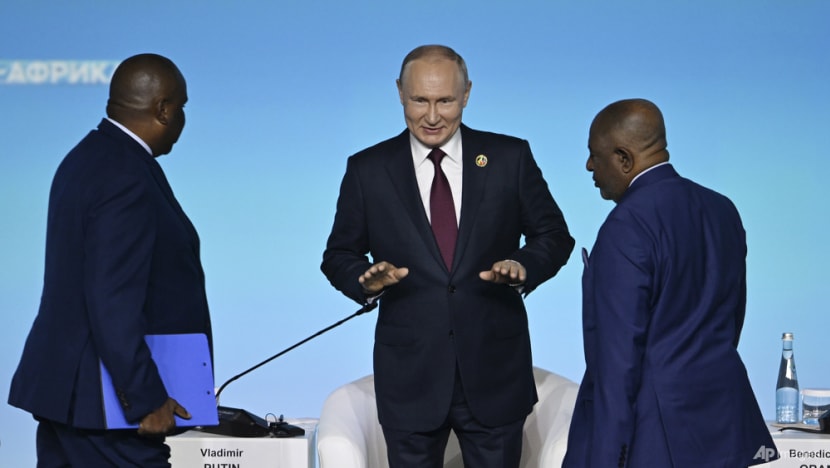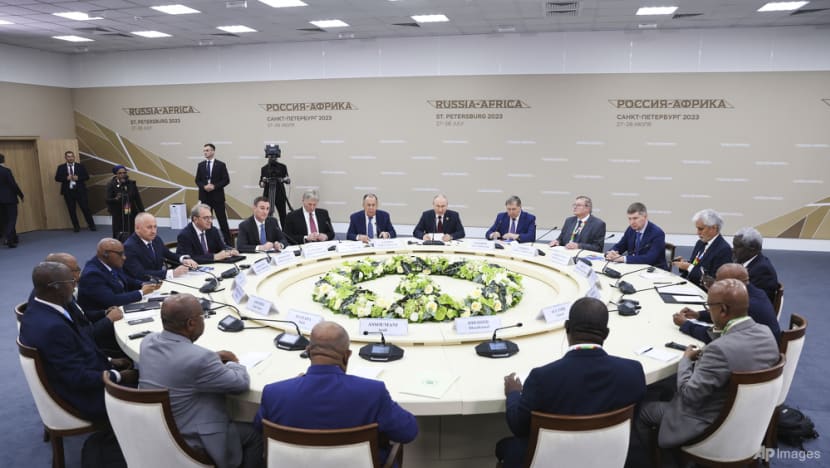Russia hosts summit of African leaders in a bid to extend influence; blames the West for 'unprecedented pressure'
Many African countries have remained neutral, even as the West tries to cut Russia off from the rest of the world over the invasion of Ukraine.

Russian President Vladimir Putin, centre, arrives for a plenary session of the Russia-Africa Summit and Economic and Humanitarian Forum in St. Petersburg, Russia, Thursday, Jul 27, 2023. (Pavel Bednyakov, Sputnik, Kremlin Pool Photo via AP)
MOSCOW: The Kremlin has blamed the West for trying to sabotage its Russia-Africa Summit in St Petersburg, saying that African states had been subjected to “unprecedented pressure” not to take part.
It said on Wednesday (Jul 26) that just 17 African heads of state would be attending.
The two-day meeting, which starts on Thursday, is part of Russia’s concerted push for influence in the region, a move also taken by the West.
Observers said many African countries have remained neutral, even as the West tries to cut Russia off from the rest of the world over the invasion of Ukraine.
Ms Amaka Anku, head of Eurasia Group’s Africa practice, said African countries are trying to play that middle ground and keep their options open.
“I think it is a reflection of most African countries' reluctance to get pulled in one way or the other,” she told CNA938.
“You want to maintain your diplomatic relationship with Russia, but going out of your way as a head of state to attend (the summit) says a little bit more.”
RUSSIA TURNS TO AFRICA FOR NEW BUSINESS DEALS
High on the summit's agenda are concerns such as the ongoing Ukraine war and food security. In particular, African leaders will be looking to Russian President Vladimir Putin for concrete promises on grain supplies.
Russia now wants to export more of its fertiliser and grain directly to Africa, after pulling out of the Black Sea grain deal, which previously ensured safe passage of Ukrainian grain-carrying ships through the Black Sea.
Some goods would be sold for profit, said Russia, while others would be donated to poorer nations.

With the West piling on sanctions against Moscow, the Kremlin is hoping to turn to Africa for new business deals.
“The most important thing is not just to arrange the grain deal, but to find some mechanisms which will allow the Russian Federation to deal with African countries directly,” said Professor Nikolay Scherbakov, leading research fellow at the Lomonosov Moscow State University's Institute of Asian and African Studies.
“This will also change the amount of grain which will be engaged in this deal and it can also influence the prices in this deal.”
When Russia pulled out of the grain deal, it accused the United States and the European Union of profiting from it while less than 3 per cent of exports went to poor nations in Africa.
But the United Nations said that 57 per cent of food exported by Ukraine was sent to developing countries.
Related:
RUSSIA USING SUMMIT TO SHOW ITS COMMITMENT
Yet, Russia believes it is able to meet the needs of Africa, even without exports from Ukraine.
It has already sent more than 10 million tonnes of grain to the region in the first half of this year. Last year, it exported 11 million tonnes of grain there.
Irina Deryugina, head of the Center for Agricultural Research and Food Security at the Russian Academy of Sciences’ Institute of Oriental Studies, said: “Economically, it’s possible through the government to purchase the grain from farmers and supply it to Africa.”
The UN has asked Russia to consider rejoining the grain deal, warning that millions of people in Africa and Asia could go hungry.
This comes as global food prices have jumped since Russia pulled out of the deal.
UN programmes are concerned that countries in the Horn of Africa, including Somalia, Kenya and Ethiopia, are depleting their food supplies and are at risk of hunger.
The UN's World Food Programme, which provides food assistance worldwide, has warned that more than 23 million people in the Horn of Africa are at risk of hunger, and the Russia-Ukraine conflict could even worsen the situation.
With some African nations heavily reliant on Russia for grain and military equipment, observers said Moscow would be keen to highlight existing cooperation between both sides.
“I think the Russian Federation is able to give the necessary amount of grain for free, but the main problem is logistics,” said Mr Sergey Sapozhnikov, Protection of Interest director at the Russian Grain Union, adding that deals with Russia may be subject to restrictions.
Russia said more companies are ready to work in Africa and improve on technology, nuclear energy and agriculture. It also plans to open up more embassies and trade missions, further expanding its influence in a region that is growing in strategic importance.
Through the summit, Russia is looking to project that they are still influential on the world stage, particularly in light of US efforts to isolate, said Ms Amaka, a regular commentator on African affairs. “They want to show that they're not isolated.”















